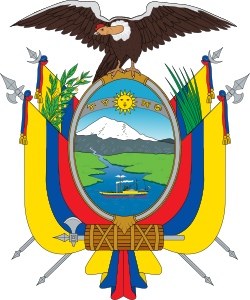 |
|---|
The Constitution of Ecuador is the supreme law of Ecuador. The current constitution has been in place since 2008. It is the country's 20th constitution.
 |
|---|
The Constitution of Ecuador is the supreme law of Ecuador. The current constitution has been in place since 2008. It is the country's 20th constitution.
Ecuador has had new constitutions promulgated in 1830, 1835, 1843, 1845, 1851, 1852, 1861, 1869, 1878, 1884, 1897, 1906, 1929, 1938, 1945, 1946, 1967, 1978, and 1998. [1] [2] Following his election as President of Ecuador, Rafael Correa called for a referendum on establishing a Constituent Assembly to write a new constitution for the country, which was held on April 15, 2007, and passed with 81.7% approval. [3] [4] The elections for the Ecuadorian Constituent Assembly were held on September 30, 2007. With 74 seats, Rafael Correa's political party, PAIS Alliance, won the majority of the 130 available seats. The assembly first convened on November 29, 2007, in Montecristi, and was given six months to write a new constitution, with a possible two-month extension. On July 24, 2008, the assembly approved a draft constitution consisting of 494 articles.
When Ecuador began the process of writing a new constitution, they received help from the Community Environmental Legal Defense Fund to draft environmental laws giving nature and ecosystems rights. [5]
The Constitution was approved by the electorate in the constitutional referendum in September 2008 by 63.93% to 28.10%.
The Constitution is the first in the world to recognize legally enforceable Rights of Nature, or ecosystem rights. [6] Article 71-74 prohibits the extraction of non-renewable resources in protected areas. Moreover, the production of monocultures will be avoided for reforestation and rehabilitation of the soil. The state will also protect the intellectual property of collective work based on national biodiversity and begin to recognize the Rights of Nature. [7]
The Constitution prohibits Ecuador from yielding jurisdiction over private trade or contract disputes to external organizations. As a result, Ecuador was forced to withdraw from the International Centre for Settlement of Investment Disputes (ICSID). [8]
The constitution is one of the first in the world to recognise the right to food. [9]
Article 281, labelled Food Sovereignty, reads: "Food Sovereignty constitutes an objective and strategic obligation from the State to guarantee its people, communities, pueblos and nationalities self sufficiency in healthy food, culturally appropriate in a permanent form." This entails the following state responsibilities: [7]
Article 15 protects agricultural, wild and genetic biodiversity by prohibiting genetically modified seeds and crops. The President and the National assembly can introduce exceptions, but genetic modification are not allowed if its intervenes with food sovereignty. [7]
According to Article 364 of the 2008 Constitution of Ecuador, the Ecuadorian state does not see drug consumption as a crime but only as a health concern. [10] Since June 2013 the State drugs regulatory office, CONSEP, has published a table that establishes maximum quantities carried by persons so as to be considered in legal possession and that person as not a seller of drugs. [10] [11]
Within the Ecuadorian Constitution adopted in 2008, Article 67 [12] limits marriage to the union of a man and a woman. [13] ("El matrimonio es la unión entre hombre y mujer...") [14] Same-sex couples became eligible for de facto civil unions based on Article 68, [15] [16] which specifies that unmarried couples in stable and monogamous unions enjoy the same rights and obligations of married couples. In 2015, the civil code was updated to allow for civil unions to be contracted without a requirement for prior cohabitation. [17]
An unofficial English language translation of Article 68:
The stable and monogamous union between two persons without any other marriage ties who have a common-law home, for the lapse of time and under the conditions and circumstances provided for by law, shall enjoy the same rights and obligations of those families bound by formal marriage ties. [13] [Note 1]
Article 68 also limits adoption rights to opposite-sex couples.
In 2019, Ecuador's Constitutional Court legalized same-sex marriage. [18]
Article 11, paragraph two of the Constitution of the Republic of Ecuador reaffirmed as a fundamental right to sexual orientation and included for the first time and even globally gender identity. Until 2008, no constitution in the world recognized gender identity. [19]
La unión estable y monogámica entre dos personas libres de vínculo matrimonial que formen un hogar de hecho, por el lapso y bajo las condiciones y circunstancias que señale la ley, generará los mismos derechos y obligaciones que tienen las familias constituidas mediante matrimonio. Article 68, Constitución de la República del Ecuador